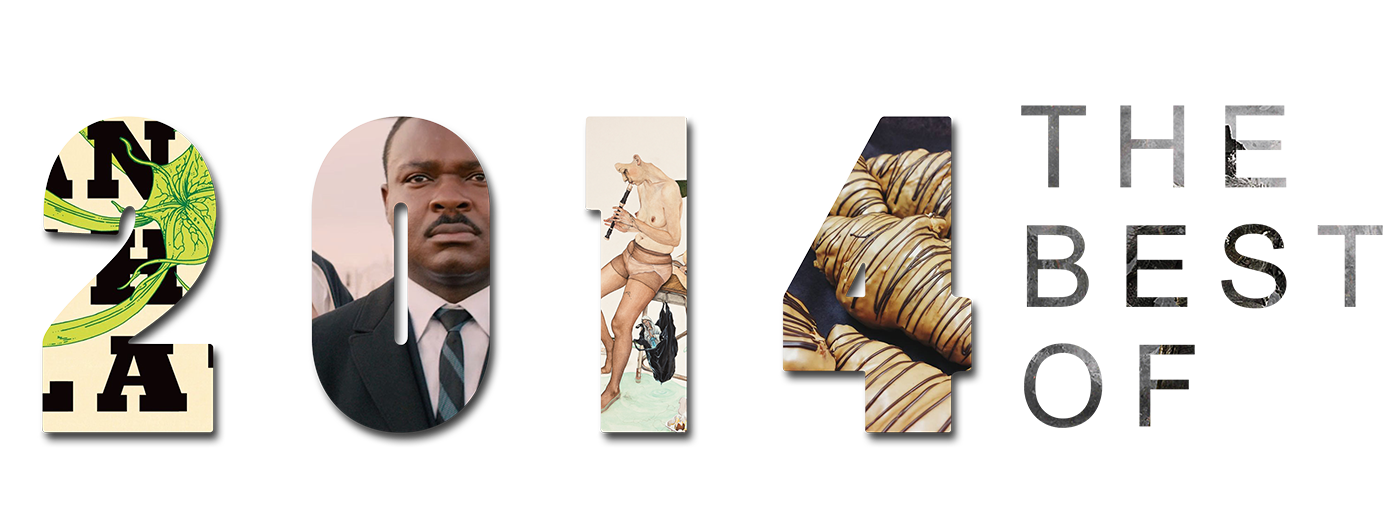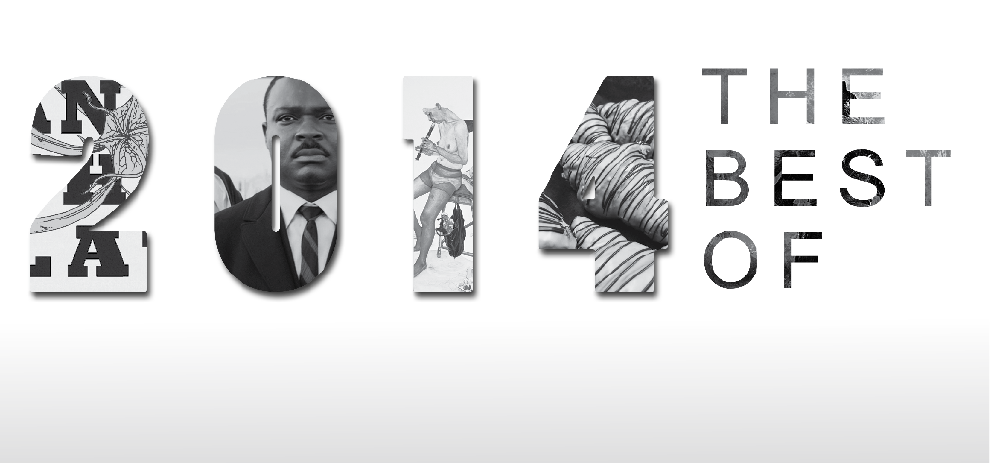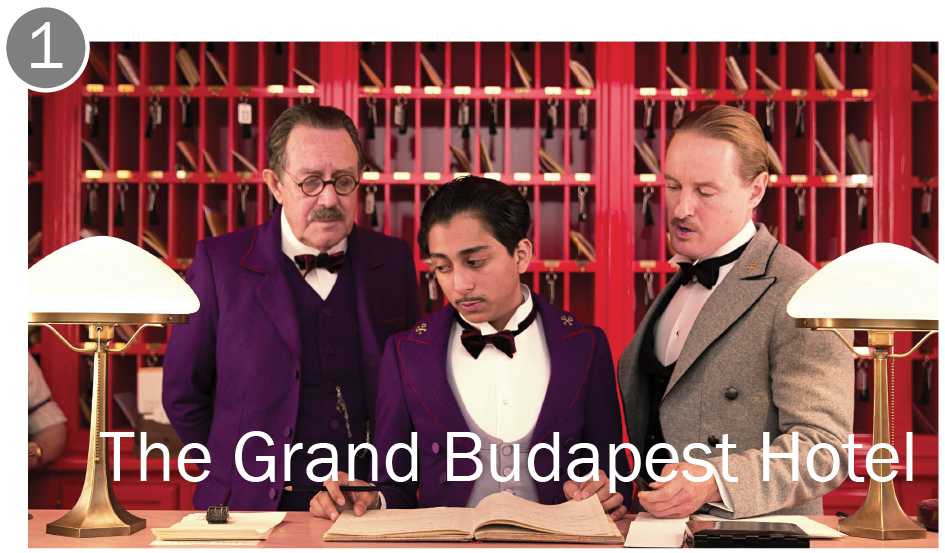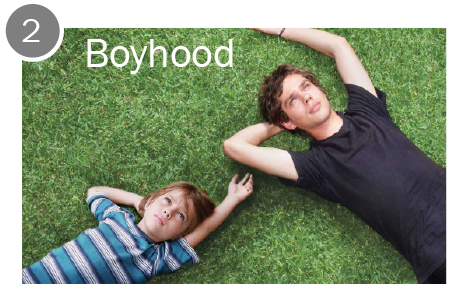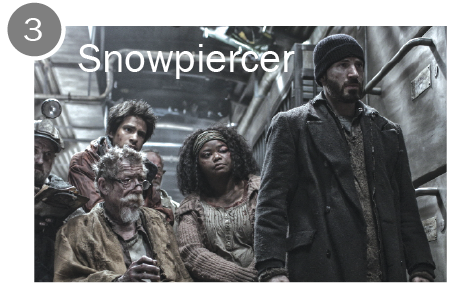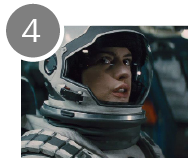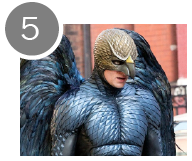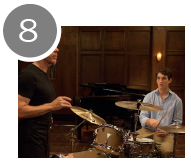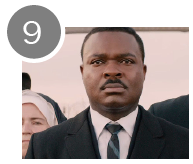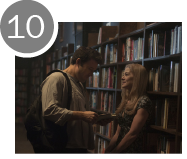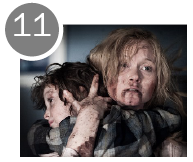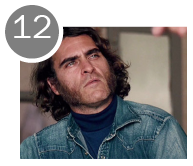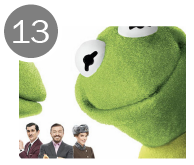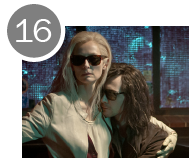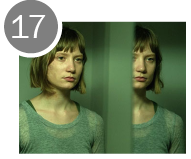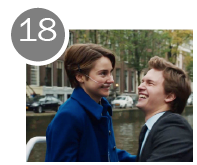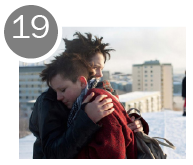Print Edition: January 21, 2015
Wes Anderson’s storybook-style The Grand Budapest Hotel is a clever exploration of the passage of time; what it leaves behind and what we hold on to forever. The film is framed with the dreary present, as a journalist tracks down the story of the Grand Budapest’s slow decay. We are swept off to the hotel’s glory days, before the devastation of war reaches its famously discreet and wonderfully pink doors. Lobby boy Zero (Tony Revolori) is swept off into adventure with the perfectly charming Concierge Monsieur Gustave following the suspicious death of a regular guest of the Grand Budapest. Their journey is filled with romance, intrigue, friendship, daintily choreographed fights and murders, a villainous Willem Dofoe, and a wise and cat-loving Jeff Goldblum. The Grand Budapest Hotel is a tale filled with lonely people who find each other, if only for a brief time that lives on in memory. — NM
Richard Linklater has proven himself to be our primary guide to cinematic time travel. Whether it’s in his Before trilogy which captures the arc of a relationship over a decade, or his lighter fare like Dazed and Confused which looks back on teenage years through the lens of nostalgia, he has shown an uncanny ability to demonstrate the subtleties of how time affects us all. The persistence and determination of all involved in Boyhood‘s 12-year production is admirable and deserves the attention it is receiving; however what is more remarkable is the film itself. A film so modest, light, and carefree and yet so powerful, Boyhood is the antithesis of the modern Hollywood blockbuster characterized by pomposity and heavy handedness. Here is a film that never claims it is telling us anything and yet in the end tries to tell us everything. — JF
It’s clear from the first five minutes that Snowpiercer will be dark, dystopian, and violent. But what makes it so fantastic is it’s not just a linear quest movie that wears its metaphors on its sleeve. Director Bong Joon-Ho does a masterful job showing, not telling, Curtis’ (Chris Evans) inner struggle as he toes the line between fighting the system and hating the train, yet realizing he’s just another piece holding it all together. The most heartbreaking parts come when the real price of a seemingly “balanced” system is revealed: the people exploited and robbed of the chance to see life any other way. The most vivid and colourful sequence in the middle of the film is also the most horrific. A masterpiece in subverting the expected route of the modern action movie. Stay for Tilda Swinton’s hilarious assessment of a shoe. — ES
Interstellar
Christopher Nolan’s movies are always welded to his inspirations, and Interstellar, rather than comic juvenilia, is transparently the work of someone immersed in the photography of Walker Evans, Philip Kaufman’s The Right Stuff, and, significantly, the epics of D.W. Griffith, the historical-revision-imaginator-inventor of “objective” intimacy, a sympathetic god’s-eye view, a seriousness that limits, but gives his works much of their forward-moving energy, inspiration tied to the American dream of progress. It’s there in the editing, the by-now expected but no less precisely timed cross-cutting that collapses space and blots motion into the shape of dreams. But in his anti-conflict, organ-crescendo, magic replaying of fumbled love, Nolan comes to resemble most closely the improvised families in M. Night Shyamalan’s work (Signs, The Village, The Happening), so often derided, but rooted, as Interstellar is, in an off-kilter world of symbols, memories, and re-opened possibilities where people go around saying things like, “You have literally raised me from the dead.” — MS
Birdman
Birdman deals with everything from duality and indicators of success to substance abuse and special effect blockbusters. Beyond its incredible script, Birdman is edited to look like it was filmed in a single take, which gives it a feeling of veracity and instability, a mood mirrored in Antonio Sanchez’s superb drum score. The characters portrayed by Michael Keaton, Edward Norton, Naomi Watts, and Emma Stone all deal with intense emotional issues that makes them seem split, like they are two halves of one whole. But the most impressive aspect of Birdman is that it tells this story through the brilliant direction and excellent writing of Alejandro González Iñárritu. Iñárritu makes Birdman more than just a black comedy riff on the recent rash of blockbuster adaptation of comic book stories by exploring the lives of flawed individuals trying to make it in our cruel and unfair world — TU
The Tale of Princess Kaguya
I thought that, the second time around, The Tale of Princess Kaguya would be a little less affecting, probably revealing itself as a slighter story because I knew what was coming. But no, this is a film that probably gets less and less forgiving with repetition, so ruthless in its time-accelerated survey of life on Earth that it can only be the work of a director, Isao Takahata, whose creative life took place in a studio now on the brink, looking back with small, but intense sympathy for the long summer days and societal traditions of 20th century Japan. A watercolour portrait of art in progress, a corrective to the solipsism of Boyhood, a movie that, like many of Studio Ghibli’s best works, could be titled In Dreams Begin Responsibilities, The Tale of Princess Kaguya‘s mixture of loss and wonder as it closes a chapter of animated history is endlessly strange: through Joe Hisaishi’s score, it almost sounds like rejoicing. — MS
Lucy
When Morgan Freeman, poetically describing the intelligence of dolphins and presenting ridiculous information so professionally it could double as an actual TED Talk, begins the countdown (from 0-100) of percentage points that, people are quick to point out, does not accurately represent the capacity of the human brain, this is something that, like most of the visual flourishes in Lucy, has less to do with the meaning of Luc Besson’s little Tree of Life than its structure and movement as an action movie. They’re reel markers, and, like science-fiction, only there for their rules (to be thrown out the window). Driverless car chases, hallway fights without a single thrown punch or bullet fired, and, just to mix things up, the unseeable cell phone signals of Paris displayed as rainbow telephone wires reaching to the clouds: Lucy is unpredictable in the sense that it is a movie piloted by a single creative mind with no interest in seeing the line between goofy and sublime. What is it about? Academic research, of course. — MS
Whiplash
The deliberate, steady drumroll tapped out by a drummer that gradually accelerates into a frenzy pace turns out to be a fitting introduction to Damien Chazelle’s breakthrough thriller, Whiplash. Miles Teller plays an aspiring jazz drummer who is invited to the prestigious Manhattan-based Shaffer Conservatory in search of one thing: greatness. Teller’s character spends his hours in his room practicing drums, listening to Buddy Rich, and practicing drums. Like Robert De Niro’s character Jake La Motta in Raging Bull, Teller plays the obstinate and unrelenting Andrew, who starts to butt heads with his cutthroat music instructor, played brilliantly by J.K Simmons, who turns the motivating teacher cliché on its head. Whiplash is an enthralling and visceral experience from beginning to end, offering a glimpse into the onstage power struggle between an instructor and his musicians, right through to the year’s best final sequence. — TU
Selma
Because Selma is a classically composed historical biopic, it can be easy to overlook just how much of a distinctive, out-of-step work it is. Most historical dramas try to imagine their subjects as people, but Ava DuVernay, in depicting Martin Luther King’s arrival in Alabama in 1965, works the other way round, placing people in every corner of the frame as the movie’s principle subjects. DuVernay sees domestic life and political action as interconnected spheres, and sees political action as not merely the influence, rhetoric, and symbolism of one man, but an endless negotiation with people, all of whom have ideas about how change can be achieved. That DuVernay tackles all this, taking a historical event and imagining all its implications instead of the most popular one, and transforms it, from the weight and meaning of its violence to the spirituality of its characters, as a cinematic inquiry of how to frame people, events, and spaces, suggests not a work depicting the past, but one attempting to describe how this same work is, must be, part of the present. — MS
Gone Girl
The first half of Gone Girl finds that place where reality meets confused nightmare; Amy Dunne (Rosamund Pike) has disappeared, and her hulking husband, Nick Dunne (Ben Affleck) finds himself being held responsible for murder in the poisonous eyes of the public. Amy paints a picture of a brilliant woman held down by housewifery and the mediocrity of the man who duped her into marriage. The latter half of the film is told through Amy’s eyes, and the story becomes a lot more creepy. The story is told in layers, through police investigation and media frenzy, the audiences’ sympathies shifting with points of view. Nick Dunne wavers between unwitting, clumsy introversion and violent narcissism; Amy, who has always been under pressure from her parents to achieve perfection, is at once sympathetic and terrifyingly unbalanced. — N.M.
The Babadook
Jennifer Kent’s debut feature The Babadook is simultaneously true to the roots of horror and daringly original. Anchored by a brilliant performance by Essie Davis as a single mother attempting to raise a difficult child without becoming a monster herself, The Babadook is possibly the best horror film to come out since Guillermo Del Toro’s Pan’s Labyrinth. And yet, to say this is the best modern horror film in years feels odd, primarily because The Babadook has very little in common with the recent trends of jump scare found footage films (Paranormal Activity) or torture films (Saw). No doubt fans of these more recent horror movements will be disappointed; Kent’s film is a better fit in the canon of 70s classics that capitalize on the primal fears of parenthood (Rosemary’s Baby, Don’t Look Now, The Brood). Much like these masterpieces of horror, The Babadook is a film with depth, atmosphere, and ambiguity, but most importantly it’s terrifying. — J.F.
Inherent Vice
Paul Thomas Anderson does not catalogue moments in Californian history, beauty, and hypocrisy so much as revive them. Using the noir genre as a way into an American cinema alternate timeline of land use, police interrogation, so-called free love, lung-burning laughter, and systematic dependency, Anderson condenses and improves upon Thomas Pynchon’s book of the same name. Rather than marathon single-sentence descriptions, Anderson, having tempered his show-off theatrics, can simply let an enormous, but immediately cohesive cast distill lifetimes into gestures, body language, and at least 50 of the best comedic line-readings of the decade. Its plot, full of muses, waves, misdirection, astrological significance, and sentimental flashbacks and sound cues, like a Hollywood melodrama’s light spilling under a foreboding door, possesses, more importantly, an internal rhyme and logic that resembles its protagonist’s attitude: deadpan reactions to out-of-control grasps at power. — M.S.
Muppets Most Wanted
Oh, those insufferable Muppets, yet again! What is this anyways, the seventh sequel?! But if you watched the much-hyped The Muppets (2011) and weren’t that impressed, have no fear, because this one is much better! Maybe it won’t surpass your love for The Muppet Christmas Carol, but speaking as someone who loves the original Muppet Show, Muppets Most Wanted stays true to Muppety Goodness (hilarious variety show parody) in a way The Muppets didn’t. Kermit, squirming away from Ms. Piggy’s eager hooves, is back where he belongs, until everything is threatened by some convincing make-up and an accent that really isn’t one. Terrific movie if you have a love of show tunes and can laugh with how gullible the Muppets can be. Also, I never understand why Statler and Waldorf won’t just admit that The Muppet Show is probably the funniest thing they’ve ever seen, because why else do they keep coming back? — E.S.
Step Up All In
Like Frances Ha or Inside Llewyn Davis, Step Up All In is a film about the creative process practiced by people the creative industry has little use for. The musical, in the classical sense of the term, is all but gone from modern cinema, and the Step Up series, for all its narrative flaws, is one of the last bearers of the spirit of Astaire, Kelly, and Minnelli: like The Band Wagon, this is a film about the messes and joys of collaborative process, bringing together the leads from each of the previous entries in the series only to reveal they have rent to pay, jobs to go to, and no time for frivolous pursuits like rehearsing dance routines. Trish Sie, known for her one-take OK Go music videos, is the best director the series has had, and places the camera squarely for the performers, who move within 3D space, searching for their moment of fleeting glory — for this, possibly the last in the series, that means a playful callback to Step Up 3‘s dreamlike “I Can’t Dance” number, a rigged competition to rival Catching Fire‘s, and an unbroken 20-minute finale: a beautiful gesture, but not an elegy. — M.S.
15. Nightcrawler
In a truly electrifying and nerve-wracking performance, Jake Gyllenhaal, alongside a fantastic script, makes Nightcrawler one of the most unforgettable experiences of 2014. His character is a dark twisted social climber with a disturbing separation from violence, even as he captures it for the media. Despite the despicable nature of his character, Gyllenhaal is always engaging. Along with writer-director Dan Gilroy and Robert Elswit’s night-time photography, Nightcrawler is a film that defies the popular convention of lead characters all the way to its climatic finish. — J.H.
Only Lovers Left Alive
Only Tilda Swinton and Tom Hiddleston could have made vampires cool again. Jim Jarmusch’s Only Lovers Left Alive is a slow and hypnotic portrayal of centuries-old love. In the modern world, vampires live off the blood-bank, and fear being poisoned by the contaminated blood of humans who live in an increasingly degraded environment. Vampires don’t hunt humans, because as Eve (Swinton) puts it, “It’s not like the old days where we could just chuck them in the Thames” alongside all the other bodies, victims of tuberculosis. After Adam’s admission of his thoughts of suicide, Eve leaves her home in Tangier to join him in his Victorian mansion in an abandoned subdivision of Detroit. They share some peace together before the arrival of young and irresponsible Ava (Mia Wasikowska), Eve’s younger sister, who unintentionally forces them out into the world again. — N.M.
Maps to the Stars
David Cronenberg, like many Eastern Canadian directors that got their start at the CBC, has always had a weird relationship with the theatre. Too formally assured to be anything near “filmed theatre,” of late Cronenberg’s digital filmmaking has become only more crammed full of oddly centred compositions, long take conversations, and unsettling, boxed-in interiors. Hitchcockian is probably one of the most mis-applied terms out there when talking about films, but Maps to the Stars, an occasionally ridiculous Greek-tragic riff on Los Angelian over-sensitive self-consciousness, actually fits the description of one of Hitchcock’s psychoanalytical pictures (Spellbound, Marnie), burrowing into the popular cure so thoroughly the actual thing and its parodic resemblance (Cusack’s walk, Pattinson’s nervous quick grin, everyone’s modelled steady pseudo-naturalism) become indistinguishable. — M.S.
The Fault in Our Stars
The Fault in Our Stars (based on the book by John Green) is a cancer story, but not a typical one. As the movie opens, Hazel Grace (Shailene Woodley) has given up on the world until, forced into a support group, she sees Auguster Waters (Ansel Elgort), who has every desire to live. His joy and ever-present optimism is exactly the inspiration Hazel needs. As time progresses and their relationship get into full-swing, their obsession over a book (An Imperial Affliction) brings them on a grand adventure that turns horribly and beautifully wrong. Directed by Josh Boone in such a way that it sucks you in, and with a cast (including Laura Dern and Willem Defoe) that translates the book’s emotion into reality, The Fault in Our Stars is a heartwarming, yet tear-streaked emotional roller-coaster of a movie. — J.S.
We Are the Best!
We Are the Best! was my favourite film of the year. I can’t remember the last time a film contained so much genuine warmth. This heartwarming and beautifully written story about the aimlessness of being a teenager gives us the subjective perspectives of three young girls during a key part of their childhood. Writer and director Lukas Moodysson provides us with a glimpse into the lives of these young girls as they form a punk band despite two of them having no musical experience. They are indeed terrible, but the film isn’t about punk music; it’s about the punk attitude that perfectly captures the defiance of being a teenager. — J.F.
Mockingjay — Part 1
With the game arena destroyed in the last movie, Katniss (Jennifer Lawrence) find herself in District 13 with Peeta (Josh Hutcherson) claimed prisoner by the Capitol. With a rebellion on the way, Katniss finds herself yet again as a symbol of hope for the other districts. Then hope begins to die, destruction rises, and Katniss is forced to leave her comfort zone, attempting to show the world what the Capitol is capable of. Lawrence balances the weight of inspiring people who have faced death and repression with the tension caused by trying not to put Peeta into greater danger. Mockingjay — Part 1 has powerful scenes and a great soundtrack (“The Hanging Tree”), making it a great first half of the last film. — J.S.

